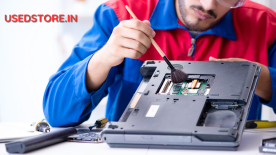In today's fast-paced digital world, having a reliable laptop is essential. Whether you're a student, a professional, or someone who simply enjoys browsing the internet and streaming content, a laptop can be your trusty companion. However, the high price tags of brand-new laptops can often be a barrier for many people. This is where second hand laptops come into play. But are they really worth it? In this blog, we'll explore the pros and cons of buying a second-hand laptop to help you make an informed decision.
Pros of Buying a Second Hand Laptop
Cost Savings: The most obvious advantage of purchasing a second hand laptop is the significant cost savings. You can often find laptops that are just a few years old at a fraction of the price of a new one, making high-quality technology more accessible to budget-conscious buyers.
Reduced Depreciation: Unlike new laptops that lose their value quickly, the depreciation rate of laptops tends to slow down after a few years. When you buy a second hand laptop, you may lose less money over time compared to buying a new one, provided you choose a model that's still relevant and in good condition.
Upgradability: Older laptops often offer greater upgradability than their modern counterparts. You can easily replace or upgrade components like RAM and storage, allowing you to customize the laptop to better suit your needs without breaking the bank.
Eco-Friendly: Buying second hand laptops is an environmentally responsible choice. It reduces the demand for new manufacturing and helps extend the lifespan of electronic devices, ultimately reducing electronic waste.
Variety of Options: The second hand laptop market offers a wide variety of options, from different brands to various specifications. This diversity allows you to choose a laptop that aligns perfectly with your requirements.
Cons of Buying a Second Hand Laptop
Uncertainty About Condition: The biggest drawback of second-hand laptops is the uncertainty about their condition. While some sellers provide accurate information and take good care of their devices, others may sell laptops with hidden defects or issues. This makes it crucial to thoroughly research and inspect any second-hand laptop you're considering.
Limited Warranty: Unlike new laptops that typically come with a manufacturer's warranty, second-hand laptops may have limited or no warranty coverage. If something goes wrong shortly after your purchase, you may have to bear the repair costs.
Outdated Technology: Some second hand laptops may not meet the performance requirements of modern software and applications. Be cautious when buying very old models, as they may not provide a satisfactory user experience.
Potential Lack of Software Support: Older laptops may no longer receive software updates and support from the manufacturer, leaving you vulnerable to security risks and compatibility issues with newer software.
Battery Life: Batteries in second hand laptops may have degraded over time, resulting in shorter battery life. Replacing laptop batteries can be expensive, so factor this into your decision-making process.
Tips for Buying a Second Hand Laptop
If you're considering purchasing a second hand laptop, here are some tips to help you make a wise choice:
Research Extensively: Investigate the specific laptop model you're interested in, including its specifications, reviews, and any known issues.
Buy from Reputable Sources: Consider purchasing from reputable sellers, such as certified refurbished laptop dealers or individuals with positive feedback and ratings on platforms like eBay or Amazon.
Inspect Thoroughly: If possible, inspect the laptop in person before buying it. Look for physical damage, test all ports and features, and ask the seller about the laptop's history and any known issues.
Check for Warranty: Verify if the laptop still has any warranty coverage or if extended warranties are available.
Negotiate and Compare: Don't be afraid to negotiate the price with the seller, and compare prices from different sources to ensure you're getting a fair deal.
In conclusion
second hand laptops can be worth it if you do your due diligence. They offer cost savings, reduced depreciation, and the opportunity to customize your device. However, there are risks involved, such as uncertainty about the laptop's condition and potential lack of software support. By carefully researching, inspecting, and considering your specific needs, you can make an informed decision and potentially find a second hand laptop that suits both your budget and your computing requirements.









